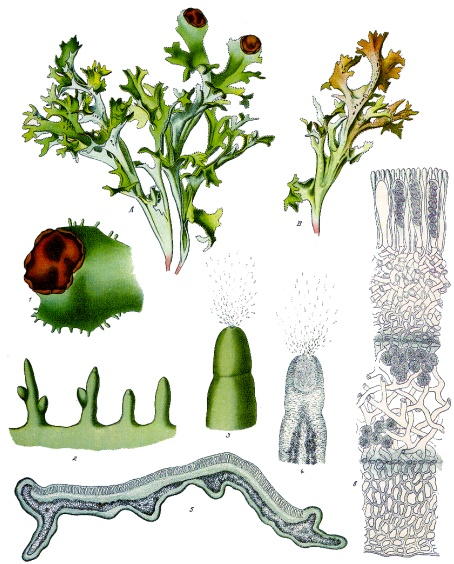Cetraria islandica (L)
Synonyms: Eryngo-leaved liverwort, Iceland
lichen
Order: Parmeliaceae
Description: Cetraria, or Iceland Moss, is in fact a foliaceous lichen with variable uneven. Its thin, branched thalli are fringed with minute papillae, rarely more than 5mm wide, the whole being quite tough and springy. The undersurface is paler than the upper surface and is covered with depressed white spots. It is found on barren stony ground throughout all northern countries and mountainous areas elsewhere; it is locally common in Britain.
Parts used: the whole plant
Collection: between May and September
Constituents: mucilage (including 40% lichenin and 10% isolichenin); bitter lichen acids (including fumaroprotocetraric, protocetraric, cetraric and usnic acids), some iodine, traces of vitamin A.
Actions: demulcent, anti-inflammatory, antemetic, relaxing expectorant, galactagogue, tonic, nutritive
Indications: gastritis, dyspepsia, vomiting, cachexia, respiratory catarrh, bronchitis
Therapeutics and Pharmacology: Cetraria is rich in mucilages and its demulcent action is of value in the treatment of gastritis, gastric ulcer, hiatus hernia, reflux oesophagitis, vomiting and dyspepsia. It helps to contain vomiting arising from irritation and inflammation of the stomach. It is indicated in cases of low-grade stomach infections seen when there is low stomach acid production, but it is also useful in ameliorating the effects of excess stomach acid secretion. In addition, its nutritive qualities contribute to the treatment of malnourishment, debility, and anorexia.
Cetraria is often used in the treatment of respiratory catarrh and bronchitis, especially in constantly recurring acute irritation in the elderly. It generally soothes the mucous membranes. It is useful for coughs and hoarseness, and is sometimes given for tuberculosis, since it acts to dissolve mucous congestion and it is believed that the lichen acids hinder the growth of the tubercle bacillus.
Combinations: For the treatment of nausea and vomiting, Cetraria may be combined with Ballota.
Caution: Excessive doses or prolonged treatment can cause gastrointestinal irritation and liver problems.
Preparation and Dosage: (thrice daily)
Dry lichen: 1-2g in decoction
Tincture: 1:5 in 40% alcohol, 1-1.5ml.
Additional Comments: Iceland moss contains up to 70% starch and has long been used as an emergency food in desolate places.
Bibliography
BHMA 1983 British Herbal Pharmacopoeia, BHMA, Bournemouth.
Grieve, M. 1931 A Modern Herbal, (ed. C.F. Leyel 1985), London.
Hoffmann, D. 1990 The New Holistic Herbal, Second Edition, Element, Shaftesbury.
Lust, J. 1990 The Herb Book, Bantam, London.
Mabey, R. (ed.) 1991 The Complete New Herbal, Penguin, London.
Mills, S.Y. 1993 The Essential Book of Herbal Medicine, Penguin, London (First published in 1991 as Out of the Earth, Arkana)
Mills, S.Y. 1993 The A-Z of Modern Herbalism, Diamond Books, London.
Polunin, M. and Robbins, C. 1992 The Natural Pharmacy, Dorling Kindersley, London.
Weiss, R.F. 1991 Herbal Medicine, Beaconsfield Arcanum, Beaconsfield.
Wren, R.C. 1988 Potter's New Cyclopaedia of Botanical Drugs and Preparations, C.W.Daniel, Saffron Walden.










